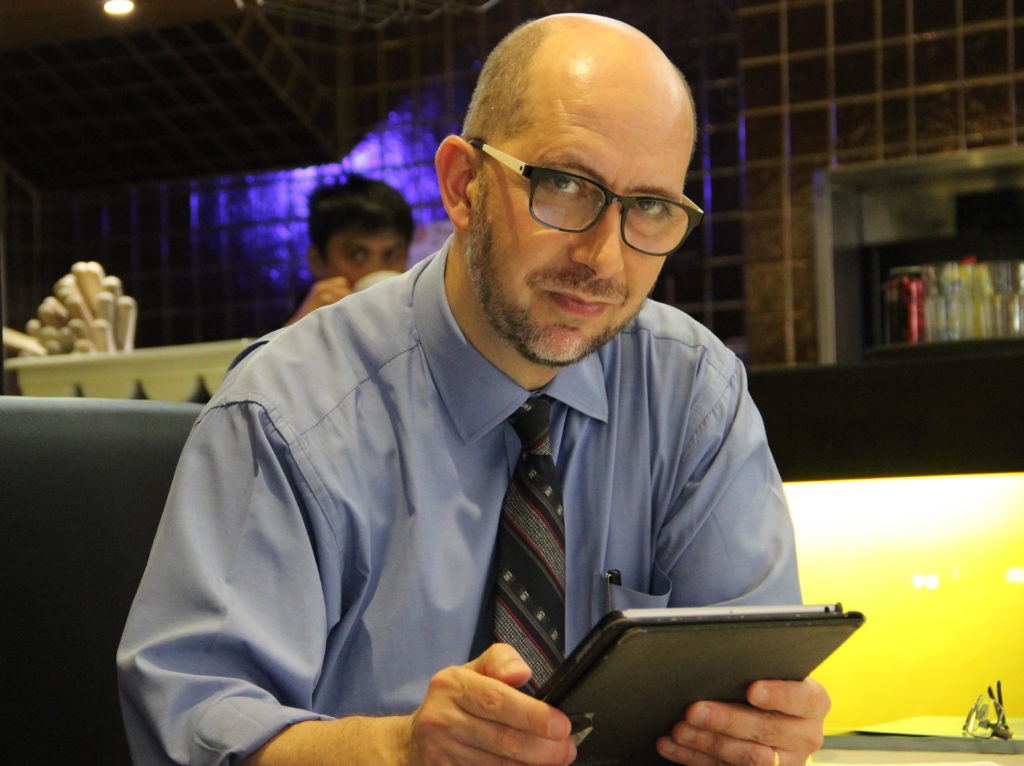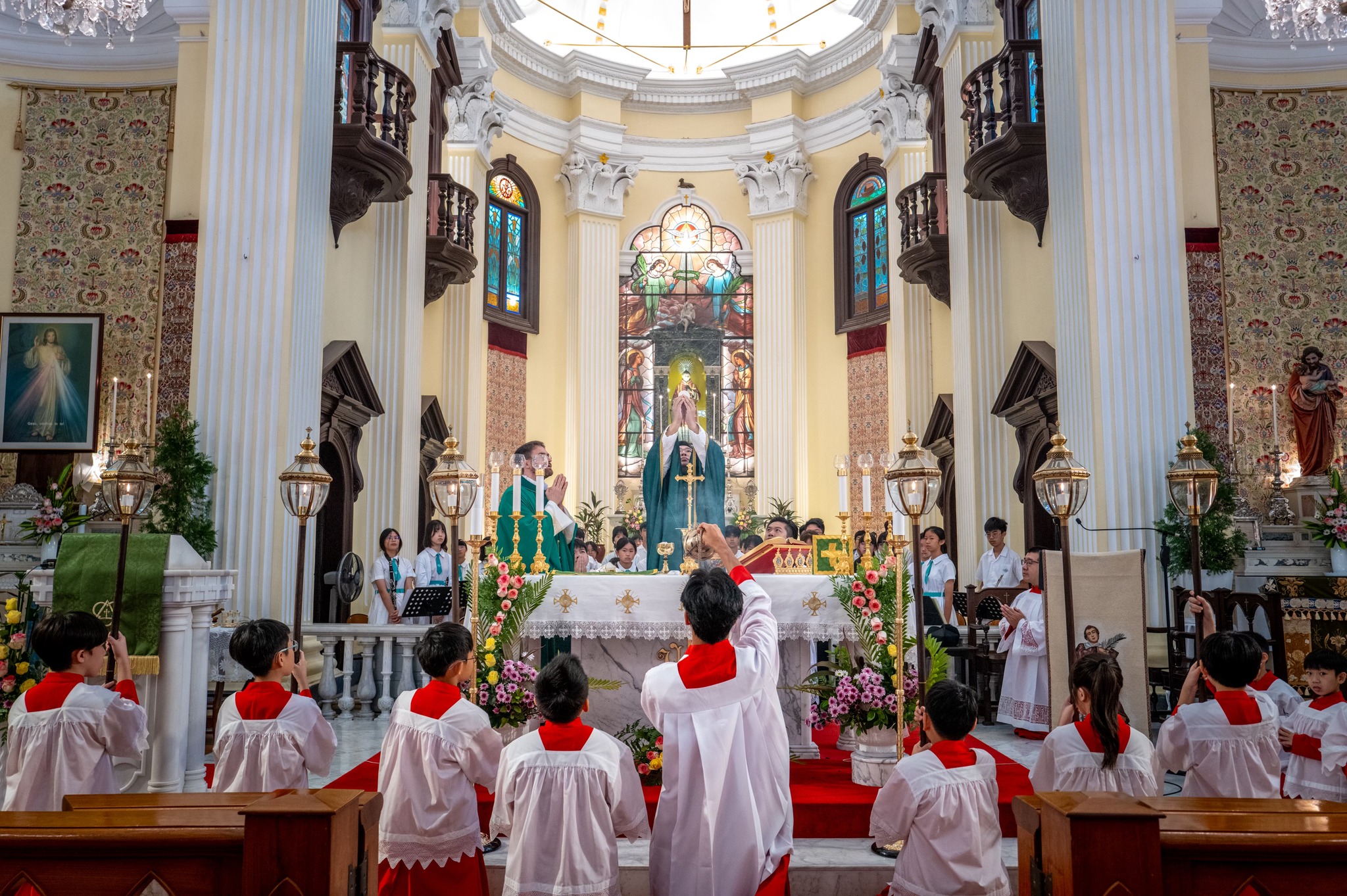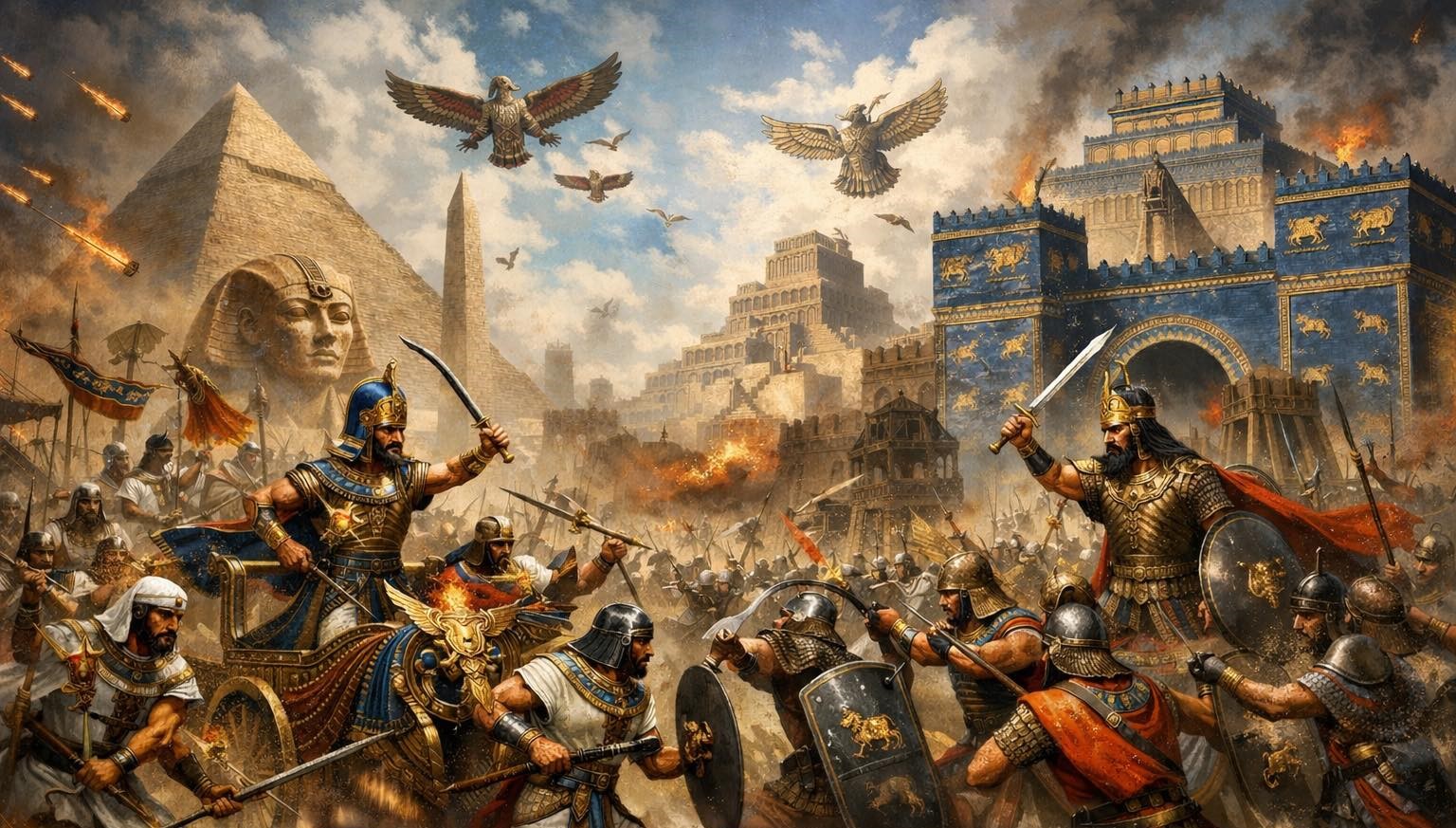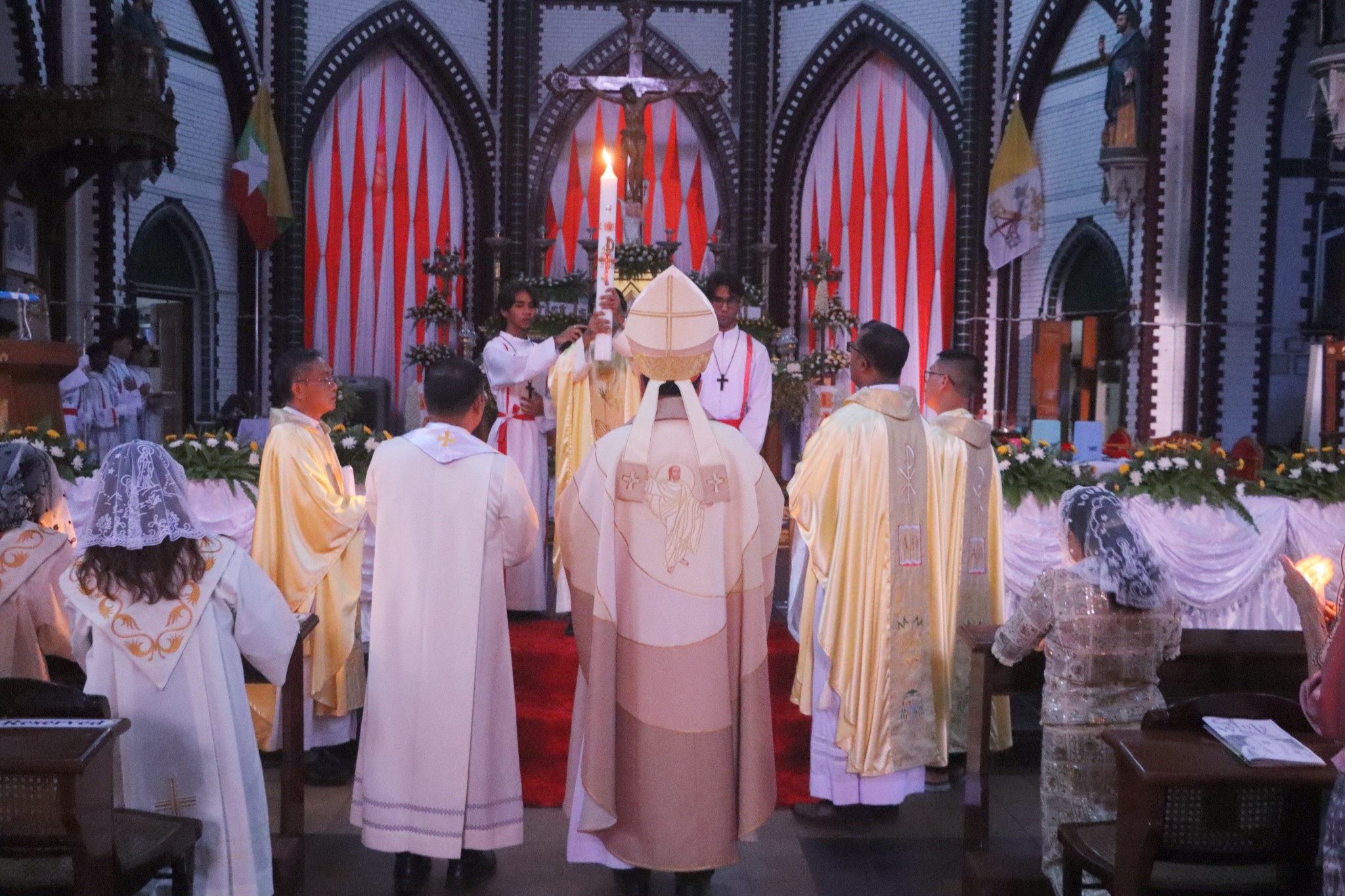– Marco Carvalho
A well renowned architect, Francisco Vizeu Pinheiro took up a new challenge two years ago: to teach the Word of God and to convey the doctrine of the Catholic Church to a group of adults. He is responsible – along with Father Daniel Ribeiro and former Portuguese Consul-general Carlos Frota – for the efforts made by the Diocese to promote the catechumenate within Macau’s Portuguese-speaking Catholic community. A member of Opus Dei and a teacher at the University of Saint Joseph, Mr Vizeu Pinheiro talks about the obstacles he found, but also of the personal growth he has experienced ever since he assumed the role of spiritual advisor.
Catechism and catechumenate are not one and the same thing. We are talking about concepts with a different nature. To talk about God with an adult is not quite exactly the same thing as to talk about the divine with a child. What are the main challenges that you face as a catechumenate supervisor?
It is a huge challenge to captivate people with a very different intellectual level, to get their attention and to make them want to know Jesus and to learn the Church’s doctrine. To teach children is, in my opinion, way more difficult. It forces us to adapt the message to the intellectual and emotional level of the children in order to convey it. Nevertheless, what I feel is that the children that are enrolled in catechism area eager to learn more about God. Children are the reason why some families still go to Sunday Mass. As I already had this experience as a catechist, Father Daniel invited me to work with him in teaching adults. He had already this kind of experience in Taipa and last year we started teaching catechism to a very diversified group of people. We have a few people coming to the classes because they want to be baptized, a few others who want to receive the sacrament of Confirmation and others still who just want to know a little bit more about Christian doctrine. We have to be open to all sort of doubts and questions: how can one be a saint, which process should one follow to achieve sanctity, what is the Incarnation, how important are the different aspects of Jesus Christ, both as God and as a man. That is the biggest challenge. There are details and doubts that are, in fact, very interesting. I am talking about the kind of details that force us to study and to revise our knowledge. Sometimes we can only answer those doubts later. One of the most interesting things about catechism for grown-ups it’s the fact that people are always very open and very enthusiastic. They ask questions, make suggestions. There are no taboos whatsoever. Everything’s open and they can explore their faith, not only with their supervisors, but also through the experiences the others had.
You were mentioning a very curious phenomenon. People take part in catechism lessons with different perspectives in mind. Some of them are trying to reconnect with the Church, while others are taking their first steps in the discovery of their own faith. You were also talking about sanctity. Is catechumenate seen by them as a way to better themselves?
We need to look at their perspectives case-by-case. People are different. Some of them value the moral aspect of this experience, while other nurture a more doctrinal dimensions. Others exist that look into a spiritual dimension and a contemplative relationship with God. Some people favor contemplation and their connection with Jesus Christ is very raw and genuine, while others have a very ethereal perspective on aspects like doctrine, theology or even philosophy. In these meetings we find different kinds of people, with different expectations and very diverse backgrounds. Sometimes those with a higher intellectual preparation show themselves to be emotionally distant from Jesus Christ, while those that have a limited theological knowledge of the Word of God display a strong affection for God’s message. The most interesting aspect about the group we are working with it’s the fact that it is, somehow, a mixed salad with all sorts of ingredients. This variety is wonderful. One year ago we had ten persons enrolled in these lessons and now we have double the number. It is a very diversified group in another sense: it includes people coming from Portugal and Africa and others born and raised in Macau. There’s young people, currently enrolled at the local universities and people who have worked their entire lives and are now retired. People with very different lives and experiences …
At a more personal level, how demanding is it to embark on such an adventure? How hard is it to prepare yourselves to answer their doubts and expectations?
We all have a different style. Father Daniel teaches the classes, with both my contribution and Mr Carlos Frota’s help. We take turns. When someone’s not available, the other one takes charge, but we have different styles and approaches. This rotation, I think, favors the students because they don’t have to deal with the same person every time. I try to revise and recall everything that I have studied in domains like philosophy or theology. That’s my main concern. I have studied theology and philosophy on my own and I consider I have a deep understanding of both. I also try to focus on the historical aspects. In my perspective, it’s absolutely crucial to understand how the Church and the doctrine became what they are today. History is also relevant and I try to include in my lessons a few historical facts. I also try to establish a connection between Judaism and Christianity. Jews are, in a certain sense, our forefathers in faith. Catholicism has its roots in the Old Testament. There’s no break between the Old and the New Testament, but a sort of continuity. This is a very important perspective, one that anchors our Christian tradition in a very ancient aspect: the saints of the Old Testament. Moses, David and Abraham, all of them had a great intimacy with God. Moses, we need to recall, is said to have seen God face to face. In the New Testament there’s no one with this kind of experience. This is a very rich tradition. How do I prepare myself for these lessons? I try to study as much as I can. Studying is a never-ending process: the more we study, the more we rediscover. This is an essential aspect and the main challenge I face. I need to be prepared to answer my own doubts if I want their doubts to be properly answered.
People come to you with very different expectations and it is not easy to trace a unified profile of those that are enrolled in catechumenate. Nevertheless, what do they have in common, apart from the desire to strengthen their faith?
One common aspect is a certain curiosity and the desire to learn more about God’s message. This is a very important aspect. The huge majority of the Catholic believers are at a very incipient level in terms of religious knowledge. They have learned the Commandments, the Sacraments and they have received the First Holy Communion, but their doctrinal knowledge is at the level of a fourth grader. There’s a big gap between the academic and cultural preparation that people receive nowadays and their spiritual and religious formation. We should be able to balance both aspects; otherwise we will be condemning ourselves to a certain incompleteness. I think people realize something’s missing and so they try to get to know God and to understand a bit more about eternal life. We know that our days on earth are numbered but we are aware that eternal life knows no boundaries. In a certain sense, by approaching God they are investing in their own future. It’s a continuous effort, this quest for knowledge, this pursuit of the Word of God.
We tend to look at Macau as a materialistic, sinful, money-driven place. Were you surprised to see this group of people trying to row against this materialistic tide? It’s almost like witnessing a flower bloom in a rubbish dump …
The more evident that contrast is, the more people feel the need to rediscover or to reinforce their faith. Saint Paul tells us: “Where the sin has abounded, grace has abounded yet more.” Sin doesn’t satisfy anyone and sometimes people get to a point where they feel so unhappy that they say to themselves “enough is enough”. In places like Macau, where offense abounds, its not unusual for people to look to God. It’s only when people hit rock bottom that they tend to see the light. Salvation and redemption will never happen without sin. To redeem ourselves is always to become stronger than offense. Sin and grace walk hand on hand. We are all sinners and we all need grace and I believe that, in Macau, there are a lot of people willing to nurture a more spiritual approach to the way they conduct their lives. Sometimes they don’t really know where to go or what can they do in order to better themselves. This happens because a certain relativism still prevails. Everything’s relative. Truth is relative. This relativist atmosphere it’s a sort of anaesthetic that people resort to in order to eliminate their doubts or the pain they suffer. Relativism does not eliminate, nevertheless, the anxiety most of us carry in our hearts. There’s space, nonetheless, in our hearts for love and one of the good things about Macau is that love can be cultivated. Through the Church and the example of the local Catholics, we have been witnesses to a few conversions and the number of people who approach God is increasing. Life doesn’t make any sense without God.
To teach adults the Word of God is something fairly recent in Macau. One of the most interesting aspects of this project is the role played by laymen. The Holy See, with the Pope reinforcing the idea that lay people are the best missionaries, is increasingly cherishing laymen. Do you share this same vision?
The Pope addresses that aspect in one of his latest encyclicals. He congratulates laymen for their apostolic work. The Holy Father says they fulfill their responsibilities in a very accurate way. One of the biggest problems we face nowadays is the fact that Catholic believers don’t make themselves heard, they don’t strive to give an example and that’s why we see so many bad things around us. If we all did our part the world would be a much better place. We were called by God ever since we were baptized. As the Gospel says, we are a people of priests and kings, a missionary people. … This already happens in a very natural way: parents teach their children how they should behave. The Catholic doctrine should be transmitted in the same way. This conveyance should, nevertheless, be seen as something normal, because it was exactly like that among the first Christian communities. We have had very good examples ever since Saint Paul’s era. Aquila and Priscilla distinguished themselves spreading the Word of God among the Greeks and we know they were merely tent makers. Christianity spread all over the Roman world due to the evangelization work made by common Catholics: merchants, teachers and soldiers. Priests were not that relevant. In the Middle Ages it started to change. We witnessed a certain clericalization and the original spirit of Christianity transformed itself. Ministers and missionaries took in their hands the role of spreading the Gospel, despite the fact that laymen are still, in theory, better equipped to fulfill that role.
You were talking about some of the questions and the doubts that have arisen in some of these meetings … Any particularly difficult?
In one of the last classes someone asked about the dichotomy between good and evil and it is never easy to talk about this aspect. The question always goes “If God is good, why do we see so much evil?” It is a very important question, but one to which each and every one of us should be able to answer by ourselves. The problem with evil is that it goes far beyond war and disease and famine. It’s a fight that lives inside us. It is not up to God to decide if we are good or evil. That choice depends entirely of us: we can choose God or we can choose ourselves, like Adam chose in the Garden of Eden. If it seems that evil lurks everywhere, it is because we, the Catholics, don’t do as much good as we should. When we blame God for all the evil there is in the world we are washing our hands and downplaying the fact that we are free to choose our own way. Saint Augustine said: “God who created you without you, cannot save you without you.” What does this mean? This means that we are free to decide between good and evil and the way we chose matters. It will help us not only to saver ourselves, but also to save the world. Most of that evil that surrounds us only exists because we don’t act, we don’t do nothing about it.
In that sense, the catechumenate can be seen as a form of action?
Yes, of course. It is, as a matter of fact, one of the Acts of the Holy Spirit: to help to enlighten those in need. Sometimes it is more important to nurture someone spiritually than to feed them when they are hungry. It’s important to provide them with something that can foster their intellectual and spiritual life. It’s a challenge, but it is a good one. It allows me to give something back to society.


 Follow
Follow


